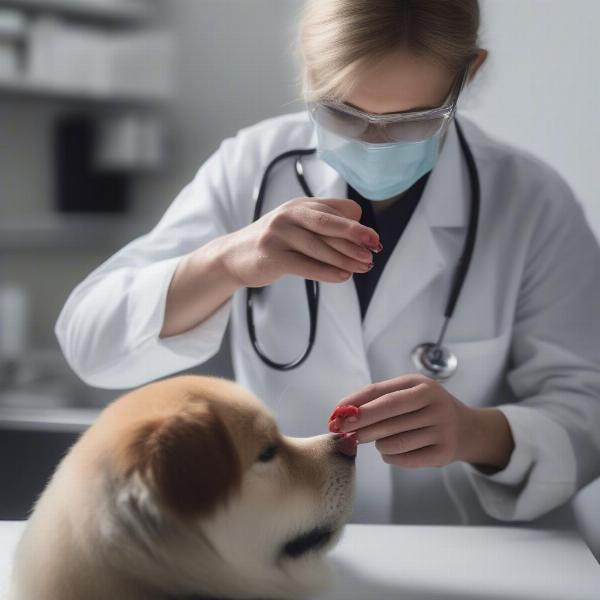A swollen red dog paw can be alarming for any pet owner. This common issue can range from a minor irritation to a serious medical condition. Understanding the potential causes, treatment options, and preventive measures can help you ensure your furry friend receives the best possible care. This article will delve into the various reasons why your dog’s paw might be swollen and red, offering practical advice and insights to address this concern.
Why is My Dog’s Paw Swollen and Red?
Several factors can contribute to a swollen, red paw in dogs. These include:
- Injuries: Cuts, punctures, or torn nails are common culprits. Sharp objects like glass or thorns can easily penetrate the paw pad, leading to inflammation and infection. Even seemingly minor injuries can become infected if not treated promptly.
- Allergies: Just like humans, dogs can suffer from allergies. Environmental allergens like pollen, grass, and dust mites, as well as food allergies, can cause paw inflammation and itching. Excessive licking and chewing can further exacerbate the swelling and redness.
- Infections: Bacterial, fungal, and yeast infections can affect a dog’s paws. Moist environments between the paw pads create a breeding ground for these microorganisms. Symptoms often include redness, swelling, discharge, and a foul odor.
- Parasites: Fleas, ticks, and mites can irritate a dog’s paws, leading to redness, swelling, and intense itching. These parasites can also transmit diseases, making prompt treatment crucial.
- Burns: Hot pavements, sand, or other surfaces can burn a dog’s paw pads, causing pain, redness, and blistering. During hot weather, be mindful of the ground temperature before walking your dog.
- Foreign Objects: Grass seeds, thorns, and small stones can become lodged in a dog’s paw, causing irritation, inflammation, and infection. These objects can be difficult to detect, requiring careful examination.
- Cysts and Tumors: While less common, cysts and tumors can also cause paw swelling. These growths can be benign or malignant, requiring veterinary diagnosis and treatment.
When to Seek Veterinary Attention
While some minor paw irritations can be managed at home, it’s essential to seek veterinary care if you notice any of the following:
- Severe swelling or pain: If your dog is limping or exhibiting signs of significant discomfort, immediate veterinary attention is necessary.
- Discharge or foul odor: These symptoms often indicate infection and require professional treatment.
- Lethargy or loss of appetite: These could be signs of a more serious underlying condition.
- The swelling doesn’t improve within a few days: Persistent swelling warrants veterinary evaluation.
 Veterinarian Examining Infected Dog Paw
Veterinarian Examining Infected Dog Paw
Treating a Swollen Red Dog Paw
Treatment for a swollen red paw depends on the underlying cause. Your veterinarian will conduct a thorough examination and may recommend:
- Cleaning and bandaging: For minor injuries, cleaning the wound and applying a bandage can promote healing.
- Antibiotics or antifungals: Infections may require oral or topical medications to eliminate the causative agent.
- Pain medication: To manage discomfort and inflammation.
- Allergy medication: For allergic reactions, antihistamines or other allergy medications may be prescribed.
- Removal of foreign objects: If a foreign object is lodged in the paw, your veterinarian will carefully remove it.
- Surgery: In some cases, surgical intervention may be necessary to address cysts, tumors, or severe injuries.
Preventing Paw Problems
Taking proactive steps can help prevent paw problems in your dog:
- Regular paw checks: Inspect your dog’s paws regularly for cuts, swelling, or foreign objects.
- Trim nails regularly: Long nails can increase the risk of injury.
- Paw protection: Consider using booties to protect your dog’s paws from hot surfaces, rough terrain, or irritating substances.
- Hygiene: Keep your dog’s paws clean and dry, especially between the paw pads.
- Parasite control: Use flea and tick preventatives to protect your dog from these pests.
Conclusion
A swollen red dog paw can be caused by various factors, from minor injuries to more serious conditions. By understanding the potential causes, recognizing when to seek veterinary care, and implementing preventive measures, you can help keep your dog’s paws healthy and happy. Remember to always consult with your veterinarian for accurate diagnosis and treatment.
FAQ
- My dog’s paw is slightly swollen and red, but he doesn’t seem to be in pain. Should I still take him to the vet? While minor swelling and redness can sometimes resolve on their own, it’s always best to err on the side of caution and consult with your veterinarian.
- What can I use to clean my dog’s paw at home? Mild soap and water are generally safe for cleaning a dog’s paw. Avoid using harsh chemicals or disinfectants.
- How can I prevent my dog from licking his paw? An Elizabethan collar can prevent your dog from licking or chewing the affected paw.
- Are there any home remedies for swollen dog paws? While some home remedies may provide temporary relief, it’s crucial to consult with your veterinarian before trying any at-home treatments.
- Can a swollen red paw be a sign of a serious illness? In some cases, yes. Persistent swelling, discharge, or other accompanying symptoms could indicate a more serious underlying condition.
my dogs paw is swollen and red
dogs paws red and swollen
my dogs paws are swollen and red
dog foot swollen
ILM Dog is a leading international dog website dedicated to providing expert advice on dog care and wellbeing. From breed selection and health to training and nutrition, we cover all aspects of responsible dog ownership. We offer a wealth of resources to help you understand your canine companion better and provide them with the best possible care. For all your dog-related queries, reach out to us at [email protected] or call +44 20-3965-8624. ILM Dog is your trusted source for expert dog care information.